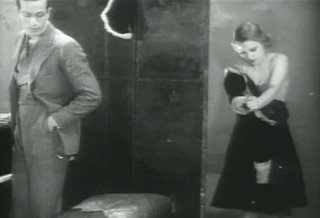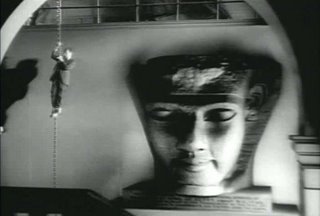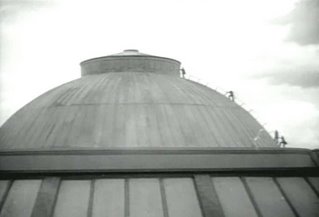Blackmail is Hitch's first sound film, but curiously, it doesn't start out that way. The film opens on a police chase, and for the first 10 minutes, we are watching a silent picture. The cops are plainly talking to one another, and a suspect is interrogated, but it's all just lip movement. It's not till after that one of the cops mentions off-handedly "That didn't take as long as I thought" , that we slip fully into sound.
One of the cops we've been following is Frank Webber, and we stick with Frank as he finishes his day, and meets his girlfriend Alice for a night on the town. Alice, however, is a little miffed at Frank for taking so long, and she lets him know. He brushes off her moodiness with the nonchalant manner of a man who has gotten to taking his girl for granted. It doesn't look like anything more than a little spat.
However, when they get to their restaurant, things perk up a bit. Alice secretly pulls out a little slip of paper passed to her by another man, who is trying to get together with her. She makes an excuse to back out of a movie with Frank, because she wants to meet this new guy in that very restaurant. Frank goes off to his movie by himself, but not before seeing Alice on the arm of the other man.
The date with the second man (an artist named Crewe), goes along innocently enough and he invites her up to his place to see his studio. It's fairly plain to see that the artist is now trying to seduce Alice here, with his paintings and arty loft. She lets herself be led along, however, after he remarks that he'd like to sketch her.

One thing leads to another, and Alice suddenly finds herself the target of an intended rape. The confrontation takes place behind a curtain, and a bread knife on the table suddenly finds it's way into Alice's hand. She stabs the artist to death. Watching this scene, it's not hard to notice that it was recycled years later in Dial M for Murder, as Grace Kelly dispatched her would-be-murderer with a pair of scissors.
It's in the aftermath of the murder, as Alice wanders the streets in a daze that we start to see a few Hitckcockian touches creep in. A neon sign featuring a martini shaker morphs into a hand with a knife. A gossipy visitor to her store prattles on about the murder, and the word "knife" repeatedly jumps out of her conversation, the rest of the words dissolving into mush.
Predictably enough, Frank is assigned to the murder investigation, and although he knows Alice was with the man, and finds her glove in his apartment, he keeps this information to himself. The blackmail of the title is introduced in the form of a shady little weasel named Tracy, who was hitting Crewe up for money and saw Alice go up to the apartment - And also saw Frank with her glove. This portion of the film is the weakest, as the blackmail only amounts to a box of cigars and a free breakfast. The film never really develops any tension around Tracy and his information, and when Tracy emerges as a possible murder suspect, the film simply skips to an extended chase scene.

In many of his films , Hitchcock would place the action in a well-known vista. Think of the Statue of Liberty in Saboteur, Mount Rushmore in North By Northwest, or Albert Hall in The Man Who Knew Too Much. It all began here , as the police pursue Tracy into the Brtish Museum, and he plunges through the top of the dome to his death.


Alice is now off the hook, since Tracy dies as the chief suspect, but Hitch isn't really done with her yet. It was a recurring theme in Hitchcock's film that an attractive blond was dragged down and humiliated in some way, and this is one of the earliest manifestations of this. You can read the murder investigation and Alices' guilty conscience as being a penance for her infidelity. After all, she sneaked around on Frank behind his back and went up to the apartment of this shady artist. The fact that she never intended to sleep with the guy is not really germane.
It's not really spelled out either, but it is nonetheless a relevant point that because Frank covered up her involvement in the crime, she is now bound to him. She has traded one blackmailer for another.
3 comments:
I'm not familiar with the sound version of this film, but it's interesting to note that the first ten minutes of the film are "silent" (I assume there's some music, right?)
The film was originally intended to be a silent film, but halfway through production it was determined to be worth turning into Britain's first talkie. And in the the end both a sound version and a silent version were released. I've only seen the latter, which I found to be quite excellent.
The Lodger has been called Hitchcock's first film to include some of the thematic and stylistic trademarks that he would return to throughout his career, and Blackmail is often noted as the first one where these trademarks were fully present. I haven't seen a large enough chuck of his early career to agree that it's the first, but otherwise I agree with the sentiment. Every scene really feels like a scene in a Hitchcock film.
Anyway, nice selection and nice post! I hope to check out the version you reviewed sometime.
Thanks for the post, Brian.
Nice post. You're right about those clearly Hitchcockian styles alright.. did i ever ask you where in Ontario you were?!
Post a Comment